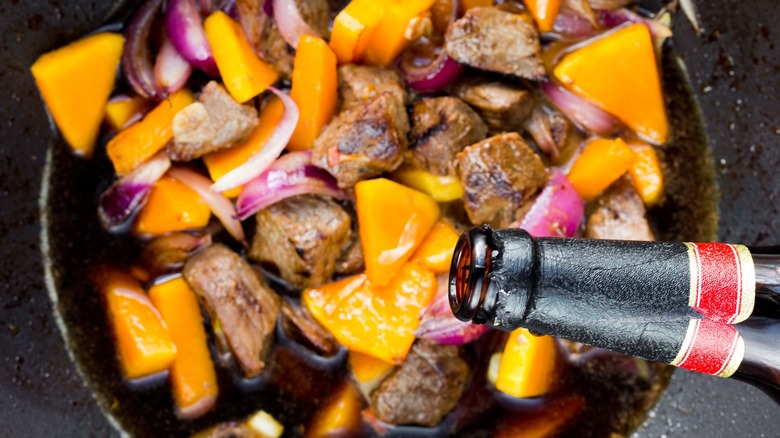Fruit Juice Is The Ideal Cognac Substitute For Alcohol-Free Cooking
People have been using alcohol's sharp scent and taste in cooking for as long as liquors have existed. But, due to various reasons — such as lifestyle choices or health concerns — not everyone can enjoy boozy recipes. However, that doesn't mean you have to give up on excellent dishes like boeuf bourguignon, which typically call for cognac to be added. Switch out the cognac for fruit juice and — surprisingly — the recipe will still work!
Cognac is commonly used in European recipes (especially in French cuisine) because it adds a delightful fruity note to the food, thanks to the fermented grapes that serve as its base. Despite being pretty potent, typically having 40% alcohol by volume or more, its flavors are relatively mild. So, if the recipe only needs cognac to make a liquid base, you can easily swap it with plain water. But if it's for flavor, you can switch it out with fruit juice.
Unsweetened white grape juice is a fantastic option for this. Its gentle sweetness and hint of tanginess make it a near-perfect match to cognac's flavor. Better yet, since fruit juice is fairly light, you can typically make a 1:1 substitute without a problem. Outside of grape juice, if you feel like experimenting, you could even give apple juice a try. While it won't taste exactly like the liquor, the extra fruitiness from apples can bring a unique twist to your dish. Plus, apple juice can still provide that touch of sweetness and acidity you're looking for in a cognac substitute.
Other alcohol-free cognac substitutes to consider
Cognac belongs to the brandy family, so it makes sense that any brandy substitute should also work for cognac. Luckily, you have plenty of options beyond using fruit juice. Other great cognac stand-ins are fruit extracts and syrups. These are concentrated fruit flavorings that give you richer and more fruity flavors compared to fruit juice. To replace cognac with fruit extract, use a simple 1:2 ratio, or 1 tablespoon of extract for every 2 tablespoons of cognac.
You can use extracts from various tangy fruits like apricots, apples, peaches, cherries, and, of course, grapes to get the flavor you want. Or, if you want more acidity to balance a savory dish instead of strong fruity flavors, try apple cider vinegar. Apple cider vinegar is packed with acidity and still has a hint of apple aroma, reminiscent of cognac. But before you can use it, you have to first dilute it with water using a 2:1 ratio. Then, take the diluted apple cider vinegar and swap it 1:1 with the cognac in the recipe.
If you're after the most authentic cognac-like flavor possible, go for brandy extract. It's the closest you can get to the flavor of cognac without having to touch the liquor itself. Brandy extract is made from a mix of natural and artificial flavoring agents to replicate the flavor of brandy-type spirits. Due to its concentrated nature, similar to fruit extracts, you should use a 1:5 substitution ratio, meaning 1 tablespoon of extract for every 5 tablespoons of cognac.

